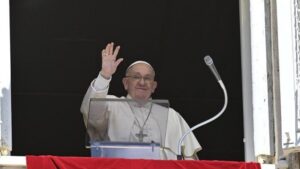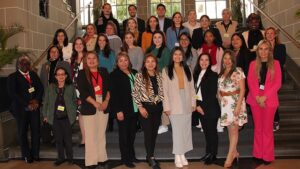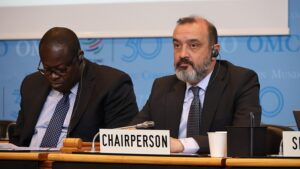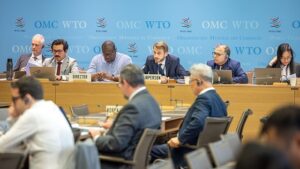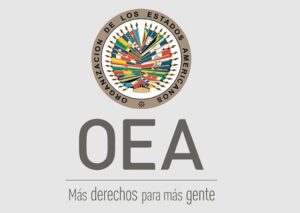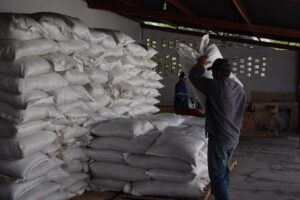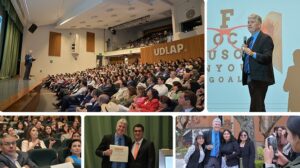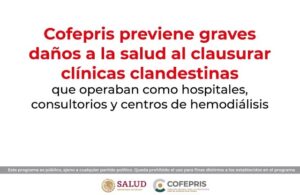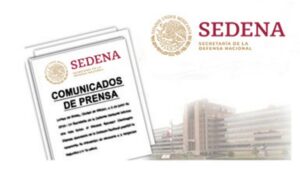La seguridad alimentaria y la urgencia de aplicar los resultados de la CM12 se ponen de relieve en una reunión sobre agricultura
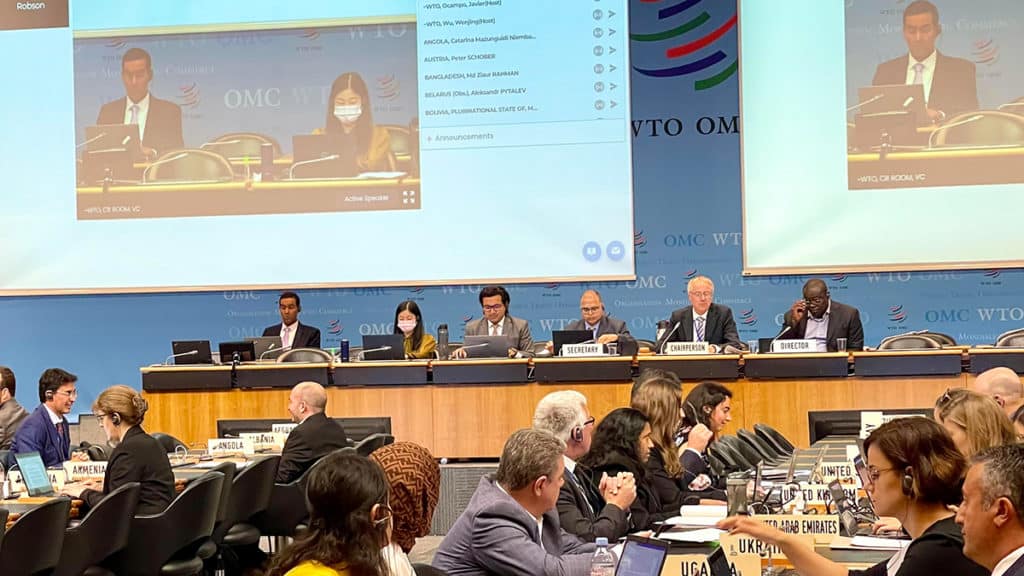
La seguridad alimentaria fue el tema principal de la reunión del Comité de Agricultura de la OMC celebrada los días 14 y 15 de septiembre, en la que los Miembros de la OMC examinaron la manera de actuar con rapidez, en el contexto actual de policrisis, para poner en aplicación los resultados alcanzados en la Duodécima Conferencia Ministerial (CM12), en particular los relacionados con la seguridad alimentaria y la respuesta de la OMC a la pandemia de COVID-19. Los Miembros siguieron examinando sus políticas agrícolas para asegurar el cumplimiento de las normas de la OMC, y abordaron también otras cuestiones relativas a la aplicación relacionadas con las decisiones ministeriales de Bali y Nairobi.
(de momento sólo en inglés)
Implementing MC12 decision on emergency response to food security
A heated debate took place in the informal meeting on 14 September, with an urgent call by some WTO members for establishing a work programme dedicated to helping net food-importing developing countries (NFIDCs) and least developed countries (LDCs) deal with food insecurity. This is in line with paragraph 8 of the MC12 Ministerial Declaration on the Emergency Response to Food Insecurity.
On the table were two proposals submitted by Paraguay (G/AG/W/223) and Egypt (G/AG/W/224), offering initial thoughts on how to structure the process going forward. Members agreed to having an open and flexible format and taking up a set of themes under the framework of the work programme. Some developing members highlighted the importance of examining food insecurity in light of the current situation and considering the policy space needed to build resilience. Some members, however, warned that discussing new flexibilities might entail negotiations that fall within the purview of the ongoing agriculture negotiations.
Members also emphasized the need for marshalling resources within the work programme from other competent international organizations, such as the UN Food and Agriculture Organization (FAO), the International Monetary Fund (IMF), the World Food Programme (WFP), the World Bank and the Organisation for Economic Co-operation and Development (OECD), to jointly address the acute global challenge.
The Chair announced an informal meeting will be convened on 11 October to offer clarity on the themes that would be taken up in the work programme as well as to agree on working methods and the process to conduct the work programme. The Chair also alluded to the possibility of organizing technical workshops on some select themes. Members have until 30 September to submit their proposals for the themes.
Implementing MC12 decision on WTO response to the pandemic
The Committee discussed how to implement the MC12 declaration on the response to the pandemic within the context of agriculture.
Both FAO (G/AG/GEN/204) and the WFP (G/AG/GEN/205) projected a gloomy prospect for food security due to the polycrisis that the world is facing – the COVID-19 pandemic, the effects of climate change, conflicts and economic downturn.
FAO laid out a set of alarming figures: nearly one in three people in the world, around 2.31 billion people, were moderately or severely food insecure in 2021 — 350 million more people than in 2019, before COVID-19 broke out. Close to 193 million people across 53 countries were in need of urgent assistance in 2021. To meet the UN zero-hunger target by 2030, the world needs to increase agricultural productivity by 28% over the next decade. In response to what it called a “seismic hunger crisis”, the WFP said it plans to assist 152 million people in 2022, reaching a record high.
Both UN agencies reaffirmed the critical role of trade, transparency, cooperation and capacity building. The WFP renewed its appreciation to the WTO for adopting a “historic decision” to exempt WFP’s humanitarian food purchases from export restrictions at MC12.
The World Bank and the IMF shared their recent work on how to rally international resources, both strategically and financially, to help the most vulnerable communities overcome current difficulties and bolster local food production.
Members welcomed the sobering studies provided by FAO and the WFP. Some members pointed out the prevailing threat of soaring fertilizer prices (especially nitrogen fertilizers) as a result of the energy shortage. Many members shared the actions they have undertaken in funding humanitarian food aid and technical support to vulnerable countries. Some noted that food prices have fallen since March, especially after the reopening of the Black Sea Grain Corridor on 1 August.
Regular review of agricultural policies
Nineteen new issues were taken up for discussion as members went through each other’s farm policies in relation to the three pillars of agriculture trade: market access, domestic support and export competition. Items discussed included China’s grain reserve and cotton subsidies, the EU’s new common agriculture policy (CAP), India’s domestic support for rice, the UK’s post-Brexit farm commitments and the US climate policy and support to biofuel producers.
On recurring issues, members continued pressing for more information on China’s cotton reserves, India’s wheat export restriction, public stockpiling policies and support for rice and Egypt’s export restrictions.
Members also seized the opportunity to seek clarity on individual notifications submitted by other members with regard to tariff quota administration, special agricultural safeguards, domestic support and export subsidy notifications.
Members heard an update on the development of several members’ request for consultations with India seeking more detailed information regarding its public stockholding programmes, in line with paragraph 6 of the Bali decision on public stockholding programme for food security purposes. Requesting members have yet to agree with India on the date and format for the consultation.
All questions submitted for the meeting are available in G/AG/W/222. All questions and replies received are available on the WTO’s Agriculture Information Management System (AG IMS).
Bali decision on tariff rate quota administration
Members approved a WTO Secretariat Tracking Register (RD/AG/83/Rev.2) as required by the Bali Tariff Rate Quota (TRQ) Decision. The register will record and track underfill of tariff quotas raised under the mechanism. The first triennial review of the operation of the decision, focusing primarily on how transparency of tariff quota administration arrangements could be further improved, will continue with an aim of concluding at the Committee’s November meeting.
Enhancing transparency
The Chair reiterated the importance of enhanced transparency in the Committee and of members submitting timely and complete notifications as well as responses to questions raised in the review process. He urged members to continue improving their compliance with notification obligations. G/AG/GEN/86/Rev.46 and G/AG/W/204/Rev.7 reflect, respectively, the current status of members’ compliance with notification obligations and the list of outstanding responses to questions raised by members at the Committee between 2013 and 2021.
Members continued discussing a proposal that the Secretariat develop a database on domestic support to facilitate their access to notified support data. The Secretariat also provided an update on the improvements to the online AGIMS reporting system.


